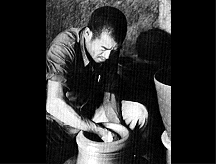
|
Crosslistings: EAST 223 |

|
Crosslistings: EAST 223 |
This survey course explores the origins and developments of classical Chinese traditions from ancient times to the Ming Dynasty (1368-1644). The goal is not comprehensive coverage of the vast number of events that
shaped
the evolution of the imperial state. Rather, students are exposed to key ideas and social practices that defined the historical consciousness of the Chinese people--and which continue to give Chinese culture it's unique
values today.
Confucius (551-479BC) was the first of many Chinese thinkers to place historical consciousness at the heart of individual and cultural identity. Speaking in the first person (a rare event) he said
in the
Analects: "I was not born knowing the past. I love the ancients and seek earnestly to know their way." The humility and the ambition of this statement will guide our inquiries in this survey class as we examine
closely
key texts and major thinkers who sought, quite literally, to live in the light of the past. Love of ancients is not a common theme in progress-oriented Western histography. Students will, therefore, be challenged to
examine
their own cultural assumptions as we delve more deeply into Chinese history.
Here, truth is not something to be scorned, theorized away or assumed to coincide with current social practice. Confucius' aim of
seeking
earnestly for historical truth is a goal for students in this class as well.
COURSE FORMAT: Lecture
Level: UGRD Credit: 1 Gen Ed Area Dept: SBS HIST Grading Mode: Graded
Prerequisites: NONE Links to Web Resources For This Course.
Last Updated on MAR-30-2006
Copyright Wesleyan University, Middletown, Connecticut, 06459